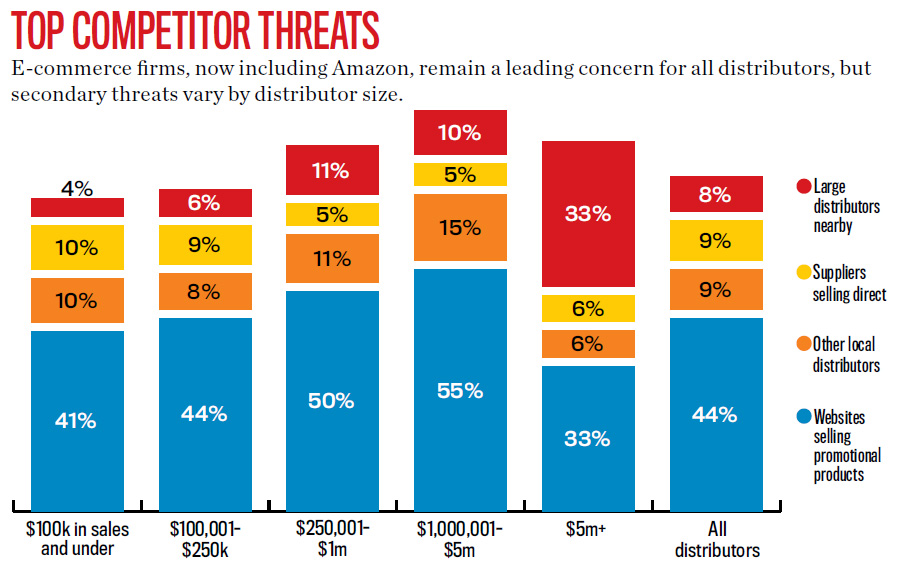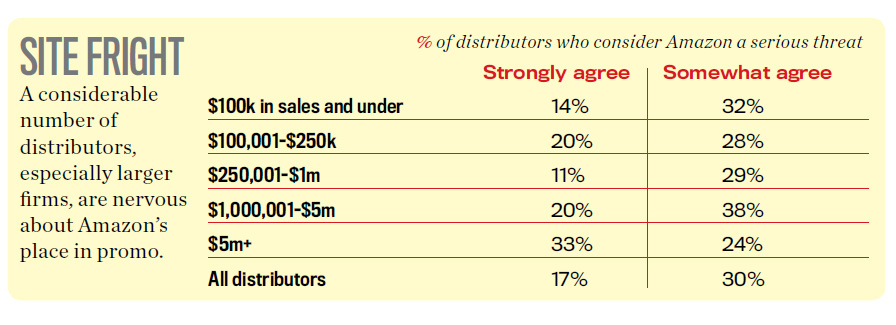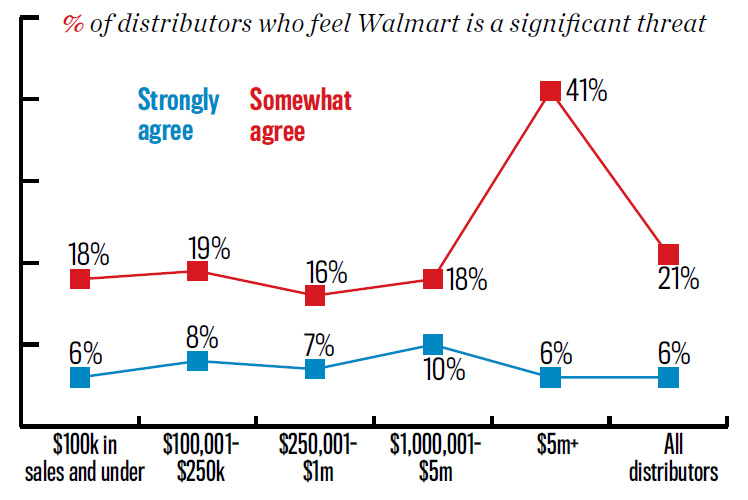August 03, 2018
SOI 2018: Amazon & The Promo Industry
The ultimate market disrupter is making a play in promo, giving some distributors pause and others prospective business.
Promotional products companies have a host of concerns about Amazon – a point underscored by the fact that nearly half of distributors believe the e-commerce power poses a threat to their business. The fears are rooted in Amazon’s demonstrated ability to dominate markets in which it competes heavily.
State of the Industry 2018 Index Page
Some industry firms worry Amazon could eventually commandeer the promo space, cutting out suppliers and distributors to gobble up market share. “By leveraging its global platform, Amazon is able to position itself as the lowest cost provider from a product and freight perspective,” says Pat Barry, EVP of sales at Top 40 distributor Boundless (asi/143717).
While Barry doesn’t see Amazon bringing its full might to bear in promo just yet, he says it’s a threat Boundless is preparing for by combining personalized service and creativity with custom online branded merchandise solutions.
Other industry pros think Amazon could one day opt to partner with only select suppliers and distributors. Under this scenario, partner firms could see sizeable sales gains due to Amazon’s reach, while competitors would lose ground. Meanwhile, some promo execs fear Amazon will increasingly bypass distributors altogether, linking up with suppliers who would sell direct through its platform.
In yet another view, others think Amazon’s disruption will center not on upending the current promo model, but on its expanding search presence. If Amazon becomes a Google of sorts, where product search rankings crown winners and relegate losers, advertising expenses would likely rise, among other issues. Suddenly, winning attention in a crowded Amazon marketplace would take on make-or-break significance.
Another topic worth watching: As Amazon’s influence grows, what promo companies could be affected most directly? In the short-term, sales at web-based distributors and at firms that specialize in program business through large online stores appear most at risk. After all, they’re playing on Amazon’s home turf.
“Amazon has proven in other markets that they do e-commerce better than anyone, and I’d have a hard time betting against them,” says Harry Ein, owner of Perfection Promo, an affiliate of Top 40 distributor iPROMOTEu (asi/232119).
Elsewhere, distributors worry about the influence Amazon has on buyer expectations. As more brandable products populate the site, consumers are – and will continue to – use Amazon as a price anchor, checking the cost of an item there and comparing it to the price quoted by a distributor. But that’s not all.
“When we used to speak of the Amazon mentality, it was about immediate delivery. Now it’s immediate returns. That’s a game changer,” says Jo-an Lantz, COO/EVP at Top 40 distributor Geiger (asi/202900). “Customers now expect this service. The rate of returns for distributors will increase because of the Amazon mentality.”
A Bridge To More Business
Of the possibilities Amazon presents to promo, some could be quite beneficial.
While some are worried about Amazon, other promo products companies are already leveraging the platform to their advantage. These firms are selling through Amazon Business – the megasite’s B2B platform – and Amazon Custom, home to an array of products anyone can customize online and purchase. Through Custom, for instance, companies sell brandable merch, providing fulfillment and sharing a portion of the sale with Amazon.
Distributor iPromo (asi/229471) is one of the firms on Amazon Business and Custom. The company also has a presence on the main Amazon site. iPromo CEO/Founder Leo Friedman says that the Chicago-based distributorship began conducting sales through Amazon a little over a year ago.
“The same people who buy consumer goods on Amazon are also making B2B purchasing decisions,” says Friedman. “We want customers to find us easily anywhere they are online.”
Currently, the percentage of total sales iPromo generates through Amazon is a small portion of its annual eight figures in revenue. Still, sales are consistently increasing month-over-month. “We’ve seen a marked uptick, and I expect that to continue,” Friedman says.
According to the CEO, the average order size is below what iPromo usually does, but the sales are welcomed, of course. “We’ve gained incremental clients that wouldn’t have found us otherwise,” says Friedman, noting customers are generally small businesses, with the occasional medium-sized business.
Typically, Friedman says, clients on Amazon have been purchasing hard goods, so for iPromo, imprinting is simple and straightforward. Popular items are USBs, pens, power banks, sunglasses and more. “Apparel is a more complicated sale. We haven’t seen anybody doing well with custom apparel on Amazon yet,” Friedman says.
The transaction structure is set up to run like this: A buyer finds a product on Amazon, uses a customization tool on the site to virtually brand it with text and artwork, and then submits an order. iPromo gets the information and does the fulfillment. Friedman says Amazon takes 15% – a charge that gets sellers’ benefits that include Amazon-backed fraud protection and coverage of credit card fees.
“That makes (Amazon’s percentage) palatable,” says Friedman, noting that Amazon assiduously monitors sellers’ performances using a spectrum of analysis points, like order defect rate and late shipment rate. Those who fail to make the grade are suspended. “They’re strict on making sure you provide the best service,” says Friedman. “They don’t want to degrade customer trust.”
While Friedman believes iPromo’s Amazon sales will continue to rise, he doesn’t believe they’ll overwhelm other more traditional revenue channels – at his firm, or others. “Given the complex nature of many custom orders, I don’t think it’ll be the preferred venue for B2B buyers in the promo products space,” he says.
 Click here for a larger image of the above graphic.
Click here for a larger image of the above graphic.
 Click here for a larger image of the above graphic.
Click here for a larger image of the above graphic.
Distributors Worry Less About Walmart
The launch of Walmart Promo Shop was one of the most talked about events in the promo industry in 2017. Still, the chatter about Walmart hasn’t translated into the same anxiety that many feel about Amazon. While 47% of distributors agree that Amazon poses a significant threat to their businesses, only 27% say the same about Walmart Promo Shop, SOI data shows.
A key reason for the difference is a pervasive perception that, while Amazon has the e-commerce power to potentially compel a paradigm shift in how promo products are sold and purchased, Walmart Promo Shop is another competitor playing within the current framework.
An e-commerce destination selling brandable merchandise directly, Walmart Promo Shop is effectively run by Texas-based distributor Harland Clarke (asi/219943) in partnership with the global retailer. It’s not, as some fear Amazon could be, an all-new marketplace with the capability of swallowing huge quantities of promo spend – at least not yet.
“Walmart has relatively inexpensive access to a large customer base, but it hasn’t created a better mousetrap,” says Steve Paradiso, president of Top 40 distributor ePromos Promotional Products (asi/188515).
Nonetheless, there are distributors who admit they’re leery, including Dan Crandall, the owner of Meadville, PA-based Fine Print Commercial Printers (asi/194109).
“If Walmart were to start selling promotional products from their stores, that has the potential to have a real impact in small towns like mine,” he says.
